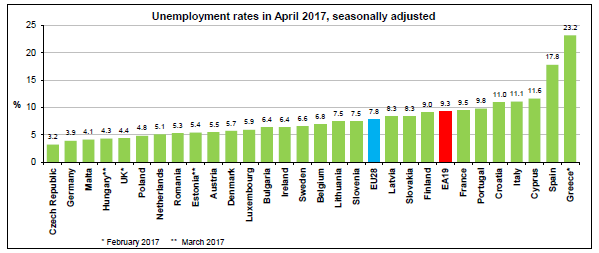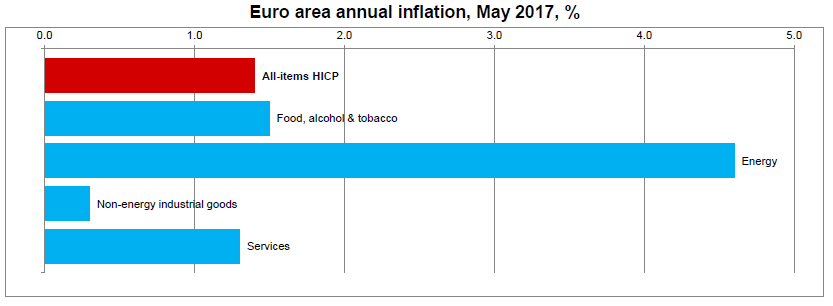Efstathiou, Konstantinos, Wolff, Guntram B., (2017), “How export growth achieved adjustment of massive trade deficits in the euro area”, Bruegel, 31 Μαΐου The reduction of current account deficits in euro-area countries since the 2008 crisis is strongly driven by increases in exports that dampened the effect on production of the fall in demand and imports. Σχετικές Αναρτήσεις Eurostat/Euro area international trade in goods surplus €30.9 bn/16 Μαϊου 2017 Petroulakis, Filippos, (2017), «Internal …Read More
Europe’s Political Spring Fixing the Eurozone and Beyond
Bénassy-Quéré, Agnès, Giavazzi, Francesco, (2017), “Europe’s Political Spring Fixing the Eurozone and Beyond”, Vox Eu, 31 Μαΐου The election of Emmanuel Macron in May 2017 has opened the door to a ‘reboot’ of the Eurozone. This is an urgent priority: the euro’s economic architecture is still incomplete, meaning any large shock could reignite the Eurozone crisis. Economists have differing views on the details of how this might happen, but they …Read More
Reflection paper on the deepening of the economic and monetary union
Dombrovskis, Valdis, Moscovici, Pierre, (2017), “Reflection paper on the deepening of the economic and monetary union “, European Commission, 31 Μαΐου The functioning and future of the Economic and Monetary Union (EMU) is a matter of interest for all European citizens from whichever Member State they come from, including those who will join the euro area in the future. After the departure of the United Kingdom from the EU, the economies …Read More
Rethinking German Economic Policy
Cohen, Desmond, (2017), “Rethinking German Economic Policy”, Social Europe, 31 Μαΐου It is only too evident that economic policy in Germany remains rooted in pre-Keynesian ideas that most macroeconomists rejected many years ago, and this helps explains the German Government’s intransigence in the face of persistent criticism – including now from the IMF. It has not been prepared to listen despite the fact that its policy stance has directly contributed …Read More
We need a European Monetary Fund, but how should it work?
Sapir, Andre, Schoenmaker, Dirk, (2017), “We need a European Monetary Fund, but how should it work?”, Bruegel, 29 Μαΐου Many voices are calling for the ESM to be developed into a fully-fledged European Monetary Fund. But what changes would this entail, and how could the new institution be governed? The authors see both need and hope for change. Σχετικές Αναρτήσεις Merler, Silvia,Schoenmaker, Dirk, Véron, Nicolas, (2017), «How will Europe’s banking …Read More
Euro area unemployment at 9.3%
Eurostat/Euro area unemployment at 9.3%/31 Μαΐου 2017 The euro area (EA19) seasonally-adjusted unemployment rate was 9.3% in April 2017, down from 9.4% in March 2017 and down from 10.2% in April 2016. This is the lowest rate recorded in the euro area since March 2009. The EU28 unemployment rate was 7.8% in April 2017, down from 7.9% in March 2017 and from 8.7% in April 2016. This is the lowest …Read More
Τη δοσολογία της ποσοτικής εξετάζει η ΕΚΤ στις 8 Ιουνίου
Η Καθημερινή, (2017), “Τη δοσολογία της ποσοτικής εξετάζει η ΕΚΤ στις 8 Ιουνίου”, 31 Μαΐου Οι κεντρικοί τραπεζίτες της Ευρωζώνης ετοιμάζονται να αλλάξουν την εκτίμησή τους για την πορεία της οικονομίας της Ευρωζώνης και τις απειλές που αντιμετωπίζει, σύμφωνα με αποκλειστικές πληροφορίες του Reuters. Στη συνεδρίαση της 8ης Ιουνίου είναι πιθανόν η ΕΚΤ να εξαλείψει από την ανακοίνωσή της την υπόσχεση να αυξήσει τα μέτρα ενίσχυσης της οικονομίας, αν χρειαστεί. …Read More
Euro area annual inflation down to 1.4%
Eurostat/Euro area annual inflation down to 1.4% /31 Μαΐου 2017 Euro area annual inflation is expected to be 1.4% in May 2017, down from 1.9% in April 2017, according to a flash estimate from Eurostat, the statistical office of the European Union. Looking at the main components of euro area inflation, energy is expected to have the highest annual rate in May (4.6%, compared with 7.6% in April), followed by …Read More
Flexible labour markets, real wages, and economic recoveries: Views of economists
Den Haan, Wouter, Ellison, Martin, Ilzetzki, Ethan,McMahon, Michael, Reis, Ricardo, (2017), “Flexible labour markets, real wages, and economic recoveries: Views of economists”, VoxEU, 30 Μαΐου Real hourly wage growth has behaved quite differently across countries over the past ten years. This column describes how the majority view of the latest Centre for Macroeconomics and CEPR expert survey is that low growth of real wages has had a positive impact on …Read More
Solving Non-Performing Loans in Europe to speed up the recovery
Beynet, Pierre, (2017), “Solving Non-Performing Loans in Europe to speed up the recovery”, OECD ECOSCOPE, 23 Μαΐου Almost 10 years after the outset of the financial crisis in summer 2008, European growth remains modest, constantly underperforming the OECD average. Several factors explain this disappointing performance. The pace of fiscal consolidation was rapid in the countries most affected by the crisis while structural reforms were not sufficiently pursued in other countries. …Read More








